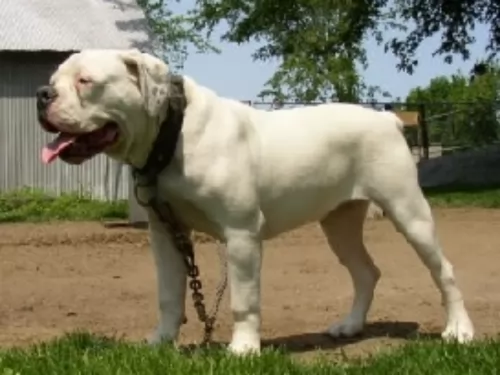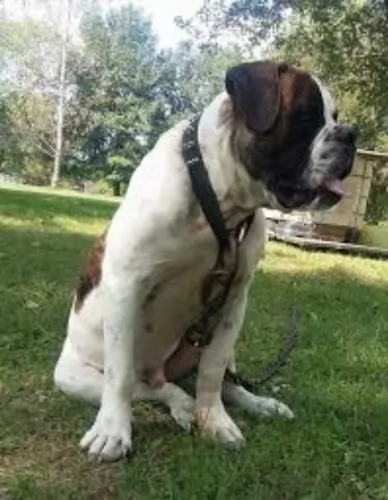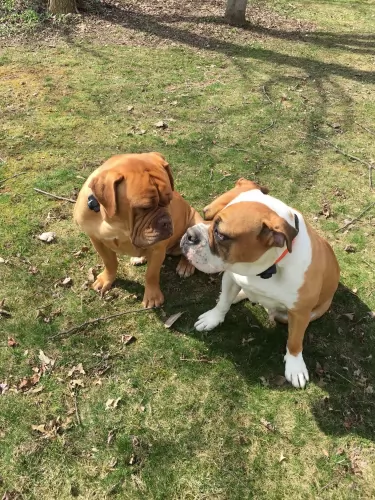 Petzlover
Petzlover Hermes Bulldogge is originated from United States but Rafeiro do Alentejo is originated from Portugal. Hermes Bulldogge may grow 12 cm / 4 inches shorter than Rafeiro do Alentejo. Hermes Bulldogge may weigh 8 kg / 18 pounds more than Rafeiro do Alentejo. Hermes Bulldogge may live 3 years more than Rafeiro do Alentejo. Both Hermes Bulldogge and Rafeiro do Alentejo has almost same litter size. Hermes Bulldogge requires Low Maintenance. But Rafeiro do Alentejo requires Moderate Maintenance
Hermes Bulldogge is originated from United States but Rafeiro do Alentejo is originated from Portugal. Hermes Bulldogge may grow 12 cm / 4 inches shorter than Rafeiro do Alentejo. Hermes Bulldogge may weigh 8 kg / 18 pounds more than Rafeiro do Alentejo. Hermes Bulldogge may live 3 years more than Rafeiro do Alentejo. Both Hermes Bulldogge and Rafeiro do Alentejo has almost same litter size. Hermes Bulldogge requires Low Maintenance. But Rafeiro do Alentejo requires Moderate Maintenance
 The Hermes Bulldogge is not a breed in itself, but is actually a line within the English Bulldogge line. The Hermes family in the United States bred this line for several years. The Hermes Bulldogge line is the largest of the re-creations from the English Bulldogge. They are inspired by the arena dogs from the days of the Roman Empire. Greg and Linda Hermes have bred healthy, smart, resilient and agile dogs. The desire of the Hermes was an attempt at recreating the 17th century dog.
The Hermes Bulldogge is not a breed in itself, but is actually a line within the English Bulldogge line. The Hermes family in the United States bred this line for several years. The Hermes Bulldogge line is the largest of the re-creations from the English Bulldogge. They are inspired by the arena dogs from the days of the Roman Empire. Greg and Linda Hermes have bred healthy, smart, resilient and agile dogs. The desire of the Hermes was an attempt at recreating the 17th century dog.
They used a variety of breeds to create the Hermes Bulldogge, most of whom are never disclosed. Some of the dogs that were probably used include: English Mastiffs, American Bulldogs, Old English Bulldogges, and pit Bull Terriers. This family of dogs are playful, friendly, and good family dogs. They have a strong prey drive which makes them good hunters but not as good around other small animals or small children. The Hermes have been breeding the Hermes Bulldogge since since 1983. The puppies are all hand raised, child friendly with great health.
When discussing the Hermes Bulldogge, one must go back to the root of the English Bulldogge. That breed comes originally from England and various lines have been recreated by various breeders. The breeding of the Old English Bulldogge with Mastiffs and Pits lead to other lines that the breeders called Old English. But most fanciers believe that only two lines of the original Old English Bulldogge remain and that is the Leavitt and the Hermes.
Some form of bulldog has been in existence since 700 years ago and as it was mixed with a variety of other breeds it took on other forms over time. The English Bulldogge was a definite couch potato. Instead of being bred for a job or look, the Bulldogge was developed with temperament, ability and health in mind. This has made for a great family dog without a lot of veterinarian bills.
 Known also as the Portuguese Mastiff, the Rafeiro do Alentejo comes from Portugal and has always been used as guardian for livestock. Their numbers declined quite a bit when there was no longer a need for this kind of job.Today it is essentially a companion dog.
Known also as the Portuguese Mastiff, the Rafeiro do Alentejo comes from Portugal and has always been used as guardian for livestock. Their numbers declined quite a bit when there was no longer a need for this kind of job.Today it is essentially a companion dog.
The official standard of the Rafeiro do Alentejo was established in 1953. The dog is is recognized as a breed by the Portuguese Caniculture Club as well as the Federation Cynologique Interationale.
 The Hermes Bulldogge, much like the original Olde English Bulldogge, is taller, healthier, more athletic than the original English Bulldog. They are medium height, with a large head, a strong body and a deep, wide chest and broad shoulders. Tails might or might not be docked but the ears are never docked. They n have a moderate amount of wrinkles and a longer, less smashed face than the original. It is easier for the Hermes Bulldogge to breath, to fly and to live in warmer environments that it is for the English Bulldogge. His eyes are lower in his head but in the front center.
The Hermes Bulldogge, much like the original Olde English Bulldogge, is taller, healthier, more athletic than the original English Bulldog. They are medium height, with a large head, a strong body and a deep, wide chest and broad shoulders. Tails might or might not be docked but the ears are never docked. They n have a moderate amount of wrinkles and a longer, less smashed face than the original. It is easier for the Hermes Bulldogge to breath, to fly and to live in warmer environments that it is for the English Bulldogge. His eyes are lower in his head but in the front center.
They are very dark almost black. Eyelids should cover the white of the eye and they have rounded cheeks. They have a short muzzle and short face. Broad, thick lips finish out the face with very large, square, broad jaws.
 The Alentejo is a large dog standing at between 64 and 75cm in height and weighing 45 to 60kg. He is a powerful dog with a deep chest, dark eyes, floppy ears. His coat is short to medium length, thick and straight. The color of the coat is a mix of fawn, a wolf grey, white, cream and black.
The Alentejo is a large dog standing at between 64 and 75cm in height and weighing 45 to 60kg. He is a powerful dog with a deep chest, dark eyes, floppy ears. His coat is short to medium length, thick and straight. The color of the coat is a mix of fawn, a wolf grey, white, cream and black.
This is a serious dog with a calm demeanour about him. It doesn’t matter how calm he is though, as every dog will require training ad socialization if you want to enjoy having an obedient, well mannered dog around you. This is particularly important with a large, independent, self-confident, territorial dog like this.
He isn’t an aggressive dog but he is protective, wanting to guard and look out for his human family. They are dogs that get on well with children and other pets in the home, being wary of strangers.
They’re not recommended for life in small properties in the city as he requires a large garden at least.
 If socialized properly this line of bulldog is harmful to me.
If socialized properly this line of bulldog is harmful to me.
Strong and athletic, his strength and stamina.
He is not very adaptable. Apartments are not good for this dog. He needs to run and if possible to hunt.
He is very intelligent but stubborn which affects his learning ability.
 The Rafeiro do Alentejo is a quiet dog, but intelligent and strong-willed. Training and socialization will make him easy to get on with.
The Rafeiro do Alentejo is a quiet dog, but intelligent and strong-willed. Training and socialization will make him easy to get on with.
He will become an excellent companion, and can come indoors because he is well mannered and considerate. He was bred to be a guard dog, and the responsibilities he had taking care of livestock has been transferred to looking out for- and protecting his human family.
He makes a wonderful pet and companion, even with children and other pets, more so when brought up correctly by loving, firm, consistent dog owners.
 The Hermes Bulldogge is healthier than most bulldogs. His face is not as smashed and he is not as wrinkled. He can breathe easier than other Bulldogs. The two major concerns are hip dysplasia and bloat.
The Hermes Bulldogge is healthier than most bulldogs. His face is not as smashed and he is not as wrinkled. He can breathe easier than other Bulldogs. The two major concerns are hip dysplasia and bloat.
Hip Dysplasia also some elbow dysplasia: can cause lameness and arthritis
Terminal unless treated immediately. Can be prevented by not feeding large meals before or after heavy exercise.
 The Rafeiro do Alentejo is a generally healthy dog breed, and with good care can get to 11, 12 or 13 years of age.
The Rafeiro do Alentejo is a generally healthy dog breed, and with good care can get to 11, 12 or 13 years of age.
Of course with a large dog like this, it is always a good idea to be aware of canine hip dysplasia, particularly because this is a large dog with a deep chest.
This makes him also vulnerable to bloat, a condition where the stomach swells with gas and which can be life threatening. Other things to watch for are ear infections and parasites.
 When feeding a Hermes Bulldogge puppy be sure you feed puppy meal for bulldogs or medium dogs. For first year fee 2-4 times a day 2 cups food.
When feeding a Hermes Bulldogge puppy be sure you feed puppy meal for bulldogs or medium dogs. For first year fee 2-4 times a day 2 cups food.
Feed the adult a solid adult dry food. 2 cups twice a day.
Better health than most lines of Bulldogs. Few wrinkles and less problems breathing as he doesn’t have a smashed face.
He doesn’t need a lot of exercise but daily walks and lots of play time. He can enjoy Lure Coursing obedience, agility and obedience
 Make your grooming time with this serious, calm canine friend of yours a special bonding time. His coat simply requires a brush twice a week to keep it healthy and shiny.
Make your grooming time with this serious, calm canine friend of yours a special bonding time. His coat simply requires a brush twice a week to keep it healthy and shiny.
While bushing him, run your hands over him to make sure there aren’t any unusual lumps. Check inside the floppy ears to make sure they’re not red which could be the start of a painful ear infection.
Look a his nails and trim them if they’ve become too long. Check inside his mouth and make sure there aren’t any black, rotten teeth as this can seriously impact the health of your pet.
Options for exercise will include long walks and a chance to run off his leash. In the back yard it will be to his benefit to throw balls for him to fetch. You can even bring him indoors and play some calm games with him. He should have exercise every single day.
Good food is needed for good health. It is always convenient to make use of the commercially manufactured dog foods there are on the market.
You don’t want to feed this to your dog day after day so provide your pet with some tasty home-made food too. Dogs want simplicity and consistency with their diets so they don’t battle with upset stomachs and an unnecessary trip to the vet.
Some home-cooked food twice a week and added to the dry kibble can keep him healthy and happy. Boiled chicken, sweet potatoes, brown rice or pasta, carrots and spinach will be perfect for him. Chop the food up finely and add it into the dry kibble once or twice a week.
Some people even cook it in bulk, refrigerate it and warm up small portions to add to the kibble. Raw meat added in occasionally can also be a good treat. Make sure your pet is never without a constant supply of fresh, cool water.